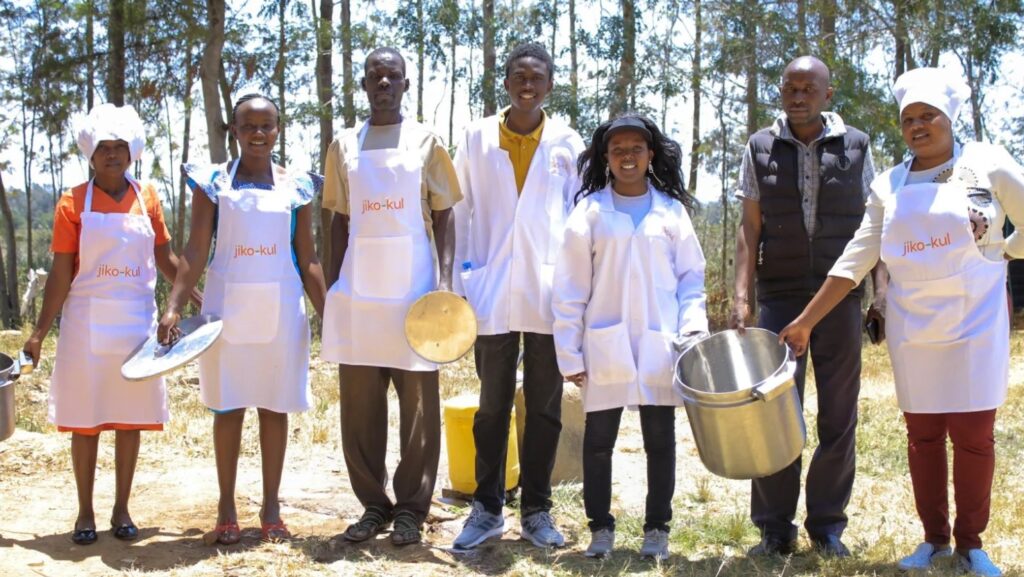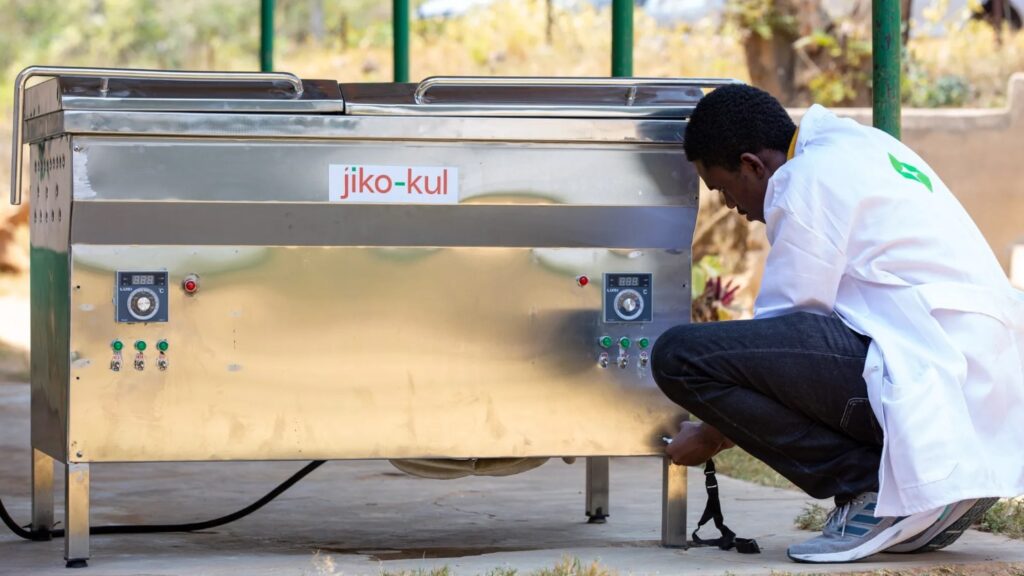Mercy Kyalo: Fostering Institutional Clean Cooking in Schools Through Innovation and Entrepreneurship
 Mercy Kyalo is the Co-founder and CEO of Feion Green Ventures, a pioneering sustainable technology company dedicated to developing innovative solutions for eco-friendly cooking and energy efficiency. At Feion Green Ventures, her primary focus is on orchestrating the development and launch of their flagship product, the Jiko-Kul, an institutional solar-powered electric cooker.
Mercy Kyalo is the Co-founder and CEO of Feion Green Ventures, a pioneering sustainable technology company dedicated to developing innovative solutions for eco-friendly cooking and energy efficiency. At Feion Green Ventures, her primary focus is on orchestrating the development and launch of their flagship product, the Jiko-Kul, an institutional solar-powered electric cooker.
The Clean Cooking Alliance (CCA) spoke with Kyalo about her remarkable achievements and efforts to foster institutional clean cooking, key lessons learned as an inspiring young woman leader in clean energy, and more.
This story is part of a series featuring youth leaders from across the clean cooking sector.
CCA: How did your journey into clean energy and clean cooking begin?
Mercy Kyalo (Kyalo): It began with a transformative experience in Lodwar, Kenya, where I witnessed firsthand the challenges faced by communities reliant on traditional cooking methods. Lodwar is a dry area with temperatures soaring to 40 degrees Celsius in recent years. Once while teaching, the school captain asked me to stop the class so that the students could fetch firewood across River Turkwel to prepare their lunch. They ended up being gone for three hours, wasting precious study time.
I conducted a survey with 10 schools in my home county and discovered that they all used firewood to cook. However, these schools paid someone to deliver firewood so that the students did not have to fetch it themselves. This eye-opening experience compounded by staggering statistics ignited a passion within me to address the pressing need for sustainable cooking solutions in underserved communities. I was compelled to leverage my skills and passion to drive meaningful change in this space.
CCA: Can you tell us more about the institutional clean cooking landscape in your country?
Kyalo: In Kenya, the institutional clean cooking landscape presents both challenges and opportunities for innovation. While institutions heavily rely on unsustainable cooking fuels like firewood and charcoal, there is a growing awareness of the need to transition towards cleaner alternatives. Despite the presence of some clean cooking technologies, significant barriers such as high upfront costs and limited infrastructure persist.
The burgeoning market for clean cooking technologies within educational, health, and correctional facilities underscores the potential for transformative impact and scalable solutions. Through Feion Green Ventures, I am committed to pioneering innovative clean cooking solutions that not only address the immediate needs of communities but also contribute to a more sustainable and equitable future for all.
CCA: What achievement are you most proud of?
Kyalo: I am most proud of the innovation we have achieved at Feion Green Ventures. Our Jiko-Kul solar-powered electric cooker represents a breakthrough in eco-friendly cooking technology, offering a sustainable alternative to traditional cooking methods in institutions – a market that has for so long been left behind in the clean cooking transition agenda.
Through field tests conducted at various institutions, Jiko-Kul demonstrated remarkable time savings, environmental stewardship, and health benefits compared to traditional cooking methods, and feedback has guided our refinement efforts. We are confident that Jiko-Kul will play a pivotal role in advancing the clean cooking agenda and improving the livelihoods of communities across Kenya and beyond. Being at the forefront of this innovation fills me with pride and reinforces my commitment to driving positive change through entrepreneurship.
CCA: How was the idea of Jiko-Kul born?
Kyalo: The encounter in Lodwar inspired me to seek a solution to alleviate the burden placed on individuals, particularly students, who spent valuable time fetching firewood instead of focusing on their education. This led me to conceptualize the idea of Jiko-Kul. Collaborating with a team of two others, we set out to design a highly versatile and reliable solar-powered electric cooker tailored to meet the needs of mass cooking in schools. The development process involved rigorous prototyping and refinement, with input gathered from both customers and experts to ensure optimal performance and user satisfaction.
CCA: What are your professional goals and ambitions?
Kyalo: Moving forward, our key objectives at Feion Green Ventures for 2024 include:
1. Commercializing the 100L and 50L Jiko-Kul Electric Pressure Cookers (EPCs).
2. Attaining Kenya Bureau of Standards certification to facilitate mass production of the 50L and 100L cookers.
3. Launching robust marketing campaigns and organizing product launches as we commence the commercialization phase of Jiko-Kul.
4. Proceeding to secure MOUs with strategic partners to drive sales and distribution of Jiko-Kul.
In addition to my role at Feion Green Ventures, I aim to inspire and empower young people to pursue innovative solutions in the sustainable energy space.
CCA: Please tell us about professional development opportunities that significantly contributed to your growth.
Kyalo: Participating in the Women in Clean Cooking (WICC) Mentorship Program, organized by the CCA, Sustainable Energy for All and the Global Women’s Network for Energy Transition, has been immensely beneficial to my professional growth in the clean cooking sector. I was paired with a mentor who provided invaluable guidance and industry insights that have helped me navigate challenges and capitalize on opportunities in my entrepreneurial journey. Additionally, being part of an inclusive, women-only program has created a supportive and empowering environment where I feel comfortable sharing my experiences, seeking advice, and learning from other women leaders in the clean cooking industry. The program played a crucial role in accelerating my professional development.
CCA: In your opinion, what barriers do youth face to engage meaningfully in the clean energy sector, and what solutions could address these barriers??
Kyalo: The barriers that youth face in meaningfully engaging in clean energy and clean cooking are multifaceted and often interrelated. Some key challenges, potential solutions, and opportunities that I would like to highlight include:
1. Building resilience and ambition among youth: Many young people I have interacted with have expressed interest in working in the clean energy sector, but they often face discouragement due to the lack of inclusive opportunities in the field. Addressing this challenge requires initiatives that empower and support youth in pursuing their aspirations. Mentorship, skills development programs, and initiatives that foster an entrepreneurial mindset can play a crucial role in building resilience and ambition among young people. By encouraging youth to set ambitious goals and providing them with the necessary support and resources, we can empower them to overcome barriers and actively contribute to the clean energy transition.
2. Disconnect between education and career opportunities: There is often a gap between the skills acquired through formal education and the practical knowledge needed to succeed in the clean energy industry. Internships, apprenticeships, and experiential learning opportunities can provide youth with hands-on experience and exposure to career pathways in clean cooking.
3. Limited access to incubation centers, entrepreneurship programs, and funding: These resources, which are critical for young entrepreneurs, are often not sufficient. Governments, NGOs, and the private sector can support youth by establishing incubation centers, offering mentorship programs, and providing funding opportunities tailored to young innovators. These programs can help unleash the creative potential of the youth and encourage collaboration and problem-solving in the clean cooking sector.
4. Being heard: There is a need to ensure that youth voices are heard and considered in policy discussions and decision-making processes. This can be achieved by creating dedicated platforms and initiatives that specifically target and engage young people, providing them with opportunities to share their perspectives, ideas, and challenges.
CCA: Do you think that young women face additional barriers in meaningfully engaging in clean energy?
Kyalo: Yes, young women often face barriers to enter in male-dominated sectors like clean energy. Addressing gender disparities requires concerted efforts to promote gender equality and to empower women’s participation. This includes creating women-targeted mentorship programs, promoting women’s leadership, and implementing policies that support gender-inclusive practices in the workforce.
CCA: What advice would you offer to young individuals, especially young women, who aspire to ignite change in clean cooking and beyond?
Kyalo: I would offer three pieces of advice:
1. Find a mentor who can offer guidance and support as you navigate the complexities of the industry. My mentor, who I met in the WICC Program, has been instrumental in helping me chart my path. Having a mentor provides invaluable insights, encouragement, and a network of resources to draw upon as you pursue your goals.
2. Invest time in research and education to deepen your understanding of the clean energy sector. Knowledge is power, and by staying informed about industry trends, market dynamics, and emerging technologies, you’ll be better equipped to identify opportunities for innovation and impact. Be open to learning from both successes and failures, and be willing to adapt your approach based on new insights and developments.
3. Take action with a sense of urgency and purpose. Time is a precious resource. Don’t wait for the perfect moment to act; instead, seize the opportunities that present themselves and embrace a mindset of continuous improvement. By moving forward with determination and focus, you’ll not only make a tangible impact but also inspire others to join you on your journey towards positive change.


